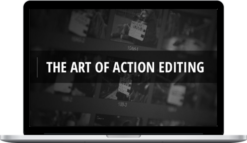David Kadavy – Design for Hackers
$149.00 $13.00
David Kadavy – Design for Hackers
Uncover the visual tools at work everywhere so you can decipher then create beautiful design
Face it: the old “Frankendesign” approach isn’t working
We’ve all been there: you’re staring at a blank canvas, and suddenly everything is still. You can’t make a single move.
Meanwhile, visions of perfection float in your head, darting in and out of your consciousness. You can’t seem to grab them before they slip away. Even if you could, you fear you couldn’t make them reality.
Time is passing, and with it, you’re missing out on all of the other things you could be doing. You could be delivering your customers real value, but you can’t even seem to get started. Every moment that passes is money down the drain.
So, you do what every other person in your position does: you “steal.” You scour the library of screenshots and links from your “inspiration” vault, trying to find something that brings that vision back to your head. You download Bootstrap once again, and try to make your idea come to life.
And a new Frankendesign is born: a mishmash of a framework, stock icons, and fonts you picked seemingly at random, but that help make that Bootstrap look less “Bootstrap-ish.”
It might get you by, but it falls way short of your vision. You’ve put so much passion and energy into your product. It doesn’t feel right to put its soul into a body that’s so lifeless.
When you understand great design, you don’t have to “fiddle”
All of this wouldn’t be so frustrating if it just didn’t matter. If only design were just pretty decorations there just for the amusement of their maker.
These days, design is more important than ever for getting taken seriously. Look at any popular app you use day-to-day: from Facebook, to Twitter, and now even Google. The bar has been raised higher than ever. Good design is no longer a “nice-to-have.” Good design is a must.
To make things even more challenging, production timelines have gotten tighter and tighter. Teams are moving forward faster than ever, with disciplines like design and development converging on tasks like never before. You need design to contribute in today’s world – not only to stand out, but to even stay relevant.
Bad design destroys credibility
How has design managed to become such a critical skill in today’s world? It may seem as if design somehow creates value out of thin air.
It turns out, that’s pretty much what good design does. It gives you instant credibility.
In a pioneering study, B.J. Fogg – who started Stanford University’s “Persuasive Technology” Lab on Stanford’s always-sunny, sequoia-tree-lined campus, discovered that design is the most important factor customers use in determining the credibility of websites. Participants in the study reviewed websites, and commented on whether they found them to be credible or not.
Over 46% of all comments about whether someone trusted a site or not were about the visual design of the site.
People said sites they trusted were “more professional-looking,” or that they “just looked more credible.”
Do you have any idea how to make something “more professional-looking,” or “just look more credible?” Probably not. That’s why you’re here.
It’s amazing that in a world where we know so much, things as simple as fonts and colors still make little sense. When you ask a designer about them, you get descriptions as head-scratching as the comments from Fogg’s credibility study. Yeah, you get that this font is “cool,” but WHY!?
Still, you try. You scrape together articles, and capture samples of designs you like. You do little test projects, and annoy your designer friends trying to pick their brains. It feels like they’re not telling you everything – as if they’re a society of magicians, sworn to secrecy.
Or maybe, you might think, a sense of design is just something you have, or you don’t. You might think your brain is “just wired differently.”
You don’t have to have a degree to design
I’m David Kadavy, the guy behind this design course. I’ve been a part of this seemingly secret society of designers. I got my degree in Graphic Design, and I even won super-prestigious fancy-pants international awards for my work.
After systematically honing my design skills to deliver in the fast-paced grinders that are Silicon Valley startups, I decided to “open source” visual design. So, I wrote a book called Design for Hackers to break down the fundamentals of good design.
Finally, developers and programmers had a way to think about design that made sense for their brains. They were so hungry for this knowledge, D4H debuted in the top 20 on all of Amazon. My puny little “hacker” book was outselling Dick Cheney!
The readers I’ve talked to have learned how to design better, faster, and with more confidence in their decisions. I’ve talked to whole teams, in fact, who have stopped burning everyone’s time arguing arbitrarily in design meetings. They finally have a common vocabulary with which to make decisions and move on!
The one complaint I’ve heard over and over again from my readers, though, is that they struggle with having the time and the motivation to actually face design head-on and add that coveted “design pro” arrow to their quivers, once and for all.
Design isn’t just for “creatives”
Many people (even designers) believe the myth that visual design is only for “visual thinkers,” “creatives,” or artists. The truth is, just like programming, math, and language, great design is simply a combination of key parts. Once you break down and understand these elements, you can put them together in a way that makes sense.
You don’t need a 4-year degree or a 300-page textbook to decipher and create beautiful design. Just learning the essential, actionable elements of design will transform how you view everything you see around you. Plus, you’ll know exactly where to start when staring down a looming project.
D4H Video is specifically designed to make the most of your precious time. I’ve condensed the concepts from Design for Hackers down to the essentials. Learn the most important elements of the D4H approach in videos that are around 5 minutes apiece, packed with up-to-date examples.
The core of the course is the Lite Package, which breaks down every little factor that comes together to create great design. The course is divided up into three modules and 20 lectures, to help you focus on each of those pieces one at a time.
To maximize your learning, I recommend the Motivation Overdrive package, which has everything you get in the Lite Package, but comes with challenges, and community access to really get these concepts programmed into your brain.
D4H Video is specifically designed to make the most of your precious time. I’ve condensed the concepts from Design for Hackers down to the essentials. Learn the most important elements of the D4H approach in videos that are around 5 minutes apiece, packed with up-to-date examples.
The core of the course is the Lite Package, which breaks down every little factor that comes together to create great design. The course is divided up into three modules and 20 lectures, to help you focus on each of those pieces one at a time.
To maximize your learning, I recommend the Motivation Overdrive package, which has everything you get in the Lite Package, but comes with challenges, and community access to really get these concepts programmed into your brain.
Motivation Overdrive 15 actionable minutes a day, community & camaraderie
You know how much you want to take your design skills to the “pro” level, but that can seem so daunting. As much design advice as you pore over day-to-day, don’t you feel like you should be there by now?
The key is making manageable progress, getting that progress built into your habits, and ultimately translating those new skills to apply to your day-to-day work.
The Motivation Pack: Finally internalize design basics
The problem most people have when trying to learn design is they get overwhelmed. They see so much great design out there, but they can’t seem to break it down and understand it in a way that they can translate into great work of their own.
They just end up copying what they see, and feeling like impostors. Or, they end up reading a huge design textbook with no idea what to do next or how to actually apply what they’ve learned.
But the key to making progress is having that progress broken down into manageable chunks. That’s the crux of the Design For Hackers Video Course.
You’ll get only the essential pieces of design in to-the-point, short lessons and then steps for applying the lesson right away – so it becomes a seamless, automatic part of your design process.
Kill overwhelm and get focused
The reason many beginning designers get overwhelmed is they don’t understand what they see. They know they’re seeing great design, but it’s not clear just what is happening to make that great design.
The Motivation Pack included in D4H Video Motivation Overdrive is designed to help you make comfortable progress, so you don’t get overwhelmed, and you can concentrate on the key components of making great design, one piece at a time.
Think like a designer
A great designer can make decisions quickly, throwing together a beautiful design with seemingly little effort. When you ask them how they did that, it seems they can never tell you.
That’s because great design habits have been programmed into their brain by doing. They have internalized great design so well, they have no conscious awareness of how they’re actually doing it.
What if you didn’t have to power through years of designs to reach this level of mastery? What if you didn’t have to just “figure it out” for yourself, writhing in agony with each new blank canvas?
The Motivation Pack is designed to give you design challenges you can do easily, building the micro-skills behind doing great design, one at a time.
Each lecture is accompanied with a 10-Minute Challenge that helps program the concepts into your brain. You set a timer for 10 minutes, and do the challenge within that set time. The focused work kills design overwhelm, and the short time frame keeps you motivated. Finally, the little pieces of design will feel easy to you.
No random articles, a plan that makes sense
Are you consistent with practicing design? Most people find themselves sorting through design articles and books in long sprints. By the end, they’re mentally exhausted, they aren’t sure what they’ve learned, and they don’t have the energy to try again tomorrow.
What they should be doing is making a habit out of learning design. Research shows that you’ll have an easier time making a habit of something if you start small.
If you’ve ever tried to start a workout program, chances are you worked out really hard for a day, then totally burnt yourself out. You didn’t have the energy to keep the program going.
The Motivation Pack comes with a 5-week schedule that will help you make a habit out of learning design.
Instead of trying to binge on design, we recommend watching one video per day, followed by a 10-minute challenge. This will guide you through understanding the framework behind design, and keep you from getting burnt out.
What You’ll Learn In Design for Hackers?
- LESSON 1: FONT ANXIETY
- LESSON 2: SIZE STRESS
- LESSON 3: COLOR CLASHES
- LESSON 4: COLUMN SOUP
- LESSON 5: NERD-EYE BLINDNESS
- LESSON 6: UNDIVIDE ATTENTION, PLEASE
 About David Kadavy
About David Kadavy
David Kadavy is author of the #18 Amazon best-selling book, Design for Hackers, and host of the Love Your Work podcast. Prior to writing Design for Hackers, David led design at two Silicon Valley startups, freelanced for clients such as oDesk, PBworks, and UserVoice, and launched numerous startups of his own – none of which failed hard enough to be worthy of mention in this bio.
David’s work has won international awards that only design snobs have heard of, and his free email courses have taught over 100,000 people the fundamentals of good design.
More courses from the same author: David Kadavy
Be the first to review “David Kadavy – Design for Hackers” Cancel reply
You must be logged in to post a review.
When will I receive my course?
You will receive a link to download your course immediately or within 1 to 21 days. It depends on the product you buy, so please read the short description of the product carefully before making a purchase.
How is my course delivered?
We share courses through Google Drive, so once your order is complete, you'll receive an invitation to view the course in your email.
To avoid any delay in delivery, please provide an Gmail and enter your email address correctly in the Checkout Page.
In case you submit a wrong email address, please contact us to resend the course to the correct email.
How do I check status of my order?
Please log in to Courseforjob account then go to Order Page. You will find all your orders includes number, date, status and total price.
If the status is Processing: Your course is being uploaded. Please be patient and wait for us to complete your order. If your order has multiple courses and one of them has not been updated with the download link, the status of the order is also Processing.
If the status is Completed: Your course is ready for immediate download. Click "VIEW" to view details and download the course.
Where can I find my course?
Once your order is complete, a link to download the course will automatically be sent to your email.
You can also get the download link by logging into your Courseforjob account then going to Downloads Page.
Related products
Design & Creative
Design & Creative
Design & Creative
Design & Creative
Design & Creative
Film Editing Pro – Premiere Pro Quickstart + Power User Pack
Design & Creative
Design & Creative












Reviews
There are no reviews yet.